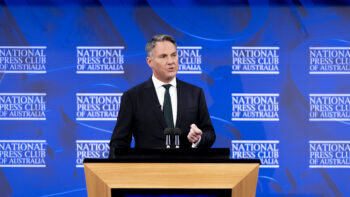
Israeli and the US are close partners, but political tensions are causing some concern amidst the militaries of both nations. (Artur Widak/NurPhoto via Getty Images)
TEL AVIV — With relations between Washington and Jerusalem feeling shaky over the potential appointment of two controversial right-wing politicians to key security roles, the Israeli Defense Forces and US military this week sent a strong signal to shore up the mil-to-mil relationship between the two nations.
That’s the reason for the Dec. 5 visit to Washington by incoming Chief of the Israeli General Staff Maj. Gen. Herzi Halevi, who met with Chairman of the Joint Chiefs Gen. Mark Milley. Halevi, who will officially take office in early January with a promotion to the rank of Lt. Gen., is the first incoming Israeli defense chief to visit DC for a formal meet and greet with his American counterpart before taking office in last least the last two decades.
According to a typically short readout from the Pentagon, “The two military leaders discussed regional security issues, opportunities for increased bilateral cooperation, coordination to defend against threats posed by Iran across the region and other items of mutual strategic interest.” An IDF spokesperson refused to release details on the issues that were discussed in the meeting.
But the real reason for the visit, defense sources here say, is explicitly to ensure continued operational dialogue with the Pentagon in case relations between the two nations’arie defense ministers becomes rocky.
RELATED: US pressure on Israel over defense minister choice puts Netanyahu in a bind
Relations between the IDF and the Pentagon are always of highest importance for Israel, but the moment feels especially fraught. While the resumption of the Iran nuclear deal seems unlikely, the situation is still up in the air, and what could follow from Iran is unclear. In addition, the growing ties between Tehran and Russia are a concern for both US and Israel’s military.
Amos Gilead served in many high-ranking positions in the IDF, including head of the Military Intelligence Research Division. He called the visit “unprecedented.”
“The fact that the Pentagon met with Halevi before he is officially in the new position shows the great importance the US defense establishment see in keeping the good, open channel with the IDF no matter what happens in the political arena in Israel,” he told Breaking Defense. “This visit is without any doubt important and rare.”
US authorities have raised alarm about two right-wing Israeli MPs, Itamar Ben-Gvir and Bezalel Smotrich, who have emerged as key power brokers as Benjamin Netanyahu attempts to build out his coalition government. Given US pressure, Netanyahu appears to have tried to thread the needle.
Ben-Gvir, a politician notorious for his anti-Arab animus and provocative acts, had sought the role of internal security minister. Instead he has been handed the role of Minister for National Security — a newly created title, with oversight of the police and border patrol. Smotrich, the head of the anti-Palestinian and anti-gay Religious Zionism party, has sought to be defense minister. He is still in negotiations with Netanyahu, but appears headed for the role of finance minister — with an extra title of “special minister” in the defense ministry, an unusual role that seems designed to give mollify both his desire for control over the military and US opposition to such an arrangement.

Herzi Halevi has been selected as the next top officer in the Israeli Defense Force. (IDF photo)
Notably, the meeting with Halevi followed a speech by US Secretary of State Antony Blinken, who on Sunday declared that the United States will continue to support Israel without reservation in spite of the concerns about the two new MPs. (Axios has also reported about a high-level meeting at the White House that occurred last week, focused on how to handle Ben-Gvir and Smotrich.)
Blinken said the United States will remain a steadfast ally of Israel even as it pursues goals that Netanyahu has opposed, such as a two-state solution to the Israeli-Palestinian conflict and restoration of the stalled 2015 Iran nuclear deal, in a speech to a left-leaning group that some on the right accuse of being too sympathetic to the Palestinians and Iran.
“We expect the new Israeli government to continue to work with us to advance our shared values,” he said, per the Times of Israel. “We will engage the government by the policies it pursues, rather than individual personalities.” https://www.timesofisrael.com/blinken-us-will-judge-the-next-israeli-government-on-policies-not-personalities/
He emphasized that the Biden administration is seeking to expand former President Donald Trump’s “Abraham Accords,” which saw numerous Arab countries repair relations with Israel, and is continuing to back its predecessor’s recognition of Jerusalem as Israel’s capital.
In late November the U.S Air Force performed a large-scale joint exercise with the Israeli Air Force (IAF). The US sent F-15E Strike Eagles, F-16, KC-10, and KC-135 refueling aircraft, with the IAF including its F-16C and F-35I Adir stealth fighter aircraft.
According to Israeli defense sources the exercise focused on long range missions including aerial refueling — what the sources said was de facto training for a scenario involving a strike on Iran.
Textron, Leonardo bank on M-346 global experience in looming race for Navy trainer
“The strength we think we bring is that [the Navy is] going to go from contract to actually starting to turn out students much quicker than any other competitors,” a Textron executive told Breaking Defense.



























